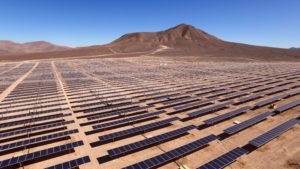As New Mexico responds to the COVID-19 crisis, it is time to consider economic recovery strategies for our state. There is wide agreement that expanding renewable energy development should be a centerpiece of that discussion, and wind and solar energy developers are ready to step up investment.
However, one undertold story in New Mexico’s quest to realize the economic and environmental benefits of renewable energy development is the critical importance of expanding the state’s electric transmission infrastructure. New Mexico has more wind and solar energy potential than almost any other state, but those resources will be stranded without new transmission lines to connect them to markets and areas where they can serve customers.
New Mexico communities are vocal in their support of the family-wage jobs and clean energy promised by new wind and solar projects, and private capital is ready to expand on the billions of dollars of renewable energy investment our state has benefitted from in the past decade. We cannot let transmission infrastructure be a roadblock to meeting New Mexico’s goals for growing and diversifying our economy while tackling climate change.
By passing House Bill 50 this legislative session, the state took an important step forward, allowing cities and counties to use industrial revenue bonds to help finance and tailor projects to local needs and treat transmission infrastructure like other economic development projects.
With this new tool, local governments have a clear role working with developers to ensure infrastructure projects are responsive to local needs while accelerating construction. That’s critical to ensuring New Mexico’s abundant wind and solar energy resources can be linked to customers and power our homes and businesses.
Local leaders are also on the front lines helping build public understanding of New Mexico’s transmission needs. Proposed transmission projects serve a variety of public interests. Some are necessary to replace aging infrastructure and reliably serve New Mexico’s commercial and residential customers. Others, like Western Spirit and SunZia, will carry 100 percent renewable electricity, helping New Mexico to meet its goals for carbon-free electricity and combat climate change while creating hundreds of new jobs in rural areas.
Local communities have a long history of driving wind and solar energy development in New Mexico to ensure projects maximize local benefits and support healthy, thriving communities while respecting our state’s heritage and need to protect our air, land and water resources.
We have witnessed firsthand the way wind and solar energy have helped keep farm families on the land and created new family-wage jobs that give our young people the chance to stay put and make a living, and we have seen the impact of new revenue in improving our schools, roads and other local services.
The companies developing renewable energy transmission lines must do their part, siting projects after careful review of cultural and water resources, wildlife habitat and other considerations.
They need to work with local governments, tribal councils and landowners in negotiating necessary easements. Typical easements allow landowners to use their property as they always have — farmers and ranchers continue their ongoing agricultural uses. Hunting and other recreation activities are also compatible with most transmission rights of way.
Our state’s leadership protecting public health in the face of a pandemic has been impressive, and we need the same determination to rebuild a robust and sustainable economy.
We have the tools in place for state and local governments to guide the economic growth and vitality of our communities while ensuring that new renewable energy projects are tailored to the needs of local communities.
Now is the time to site, permit and build more transmission infrastructure, and do it quickly, to continue to build on our successful start to a more prosperous and sustainable future for New Mexico.
Rikki Seguin is executive director for the Interwest Energy Alliance and Ben Kelahan is the co-founder of ReNew Mexico. Interwest Energy Alliance is a regional trade association headquartered in New Mexico dedicated to the responsible expansion of renewable energy. ReNew Mexico is a group dedicated to supporting the development of renewable energy projects and related infrastructure throughout New Mexico.
When advocates like you speak out, we bring people power to the movement for a clean future! You can support this solar project and other projects around the state by signing our petition today.
Found Online:
https://www.santafenewmexican.com/opinion/commentary/energy-infrastructure-development-can-boost-recovery/article_0a5ee5a8-7da9-11ea-8033-f76e89ebe01d.html


